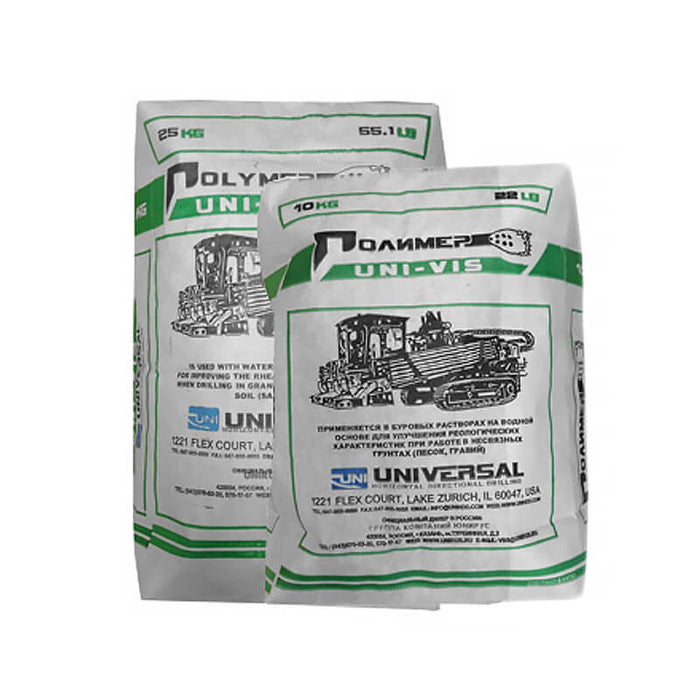
UNI-VIS HDD Polymer
UNI-VIS-byopolymer is used for drilling in non-cohesive soil (sand, gravel, etc.) for the purpose of increasing rheological characteristics (carrying capacity, gel strength). On high complexity job sites preferably to use it in combination with UNI-PAC;
UNI-VIS is a dispersible, non-clarified, high-molecular weight biopolymer used for increasing viscosity in water-base base drilling fluid systems.
Small quantities provide viscosity and weight material suspension for all water-base mud systems. Uni-Vos biopolymer has the unique ability to produce a fluid that is highly shear-thinning and thixotropic.
Typical Physical Properties
Physical appearance ……………………………….Cream-to-tan powder
Specific gravity………………………………………………………………..1.5
Bulk density…………………………………………..50 lb/ft3 (800 kg/m3)
Applications
The primary function of Uni-Vis biopolymer is to increase viscosity for cuttings transport and suspension. It performs effectively in all water-based fluids, ranging from highly weighted to low-solids systems. This includes freshwater, seawater, salt and heavy-brine fluid systems.
The amount of Uni-Vis required depends upon the desired viscosity. Normal concentrations range from 0.25 to 2 lb/bbl (0.71 to 5.7 kg/m3) for most mud systems. Special fluids and difficult hole-cleaning conditions can require higher concentrations of, up to 41b/bbl (11.4 kg/m3).
The addition of salt, antioxidant and thermal stabilizers improve temperature stability in fluids from 250 to >280° F (121 to >138° C). Specially formulated systems have been used at temperatures of 400° F (204° C). Uni-Vis is subject to bacterial degradation, and treatments with a biocide is recommended to prevent fermentation.
Advantages
- Highly effective viscosifier; with minimal treatments producing significant results
- Shear-thinning rheological profile for improved hydraulics
- Minimum frictional pressure losses for additional hydraulic horsepower at the bit and low, high shear-rate viscosity for maximum penetration rates
- iscous laminar flow in the annulus for improved wellbore stability with maximum hole-cleaning and suspension capacity
- Mixes easily
Limitations
- Trivalent ions such as chromium and iron can cause biopolymer precipitation and loss of viscosity or crosslinking
- Intolerant of high-pH or high-calcium-ion conditions
- Uni-Vis systems should be pretreated with either sodium bicarbonate or SAPP and citric acid prior to drilling cement
- Subject to bacterial degradation, a biocide should be used to prevent fermentation
- The slightly anionic nature of Uni-Vis biopolymer requires special mixing procedures when combined with cationic materials
Toxicity and Handling
Bioassay information is available upon request. Handle as an industrial chemical, wearing protective equipment and observing the precautions described in the Material Safety Data Sheet (MSDS).
Storage
Store at room temperature in a dry, well-ventilated area. Keep in original container. Keep container closed. Store away from incompatible
